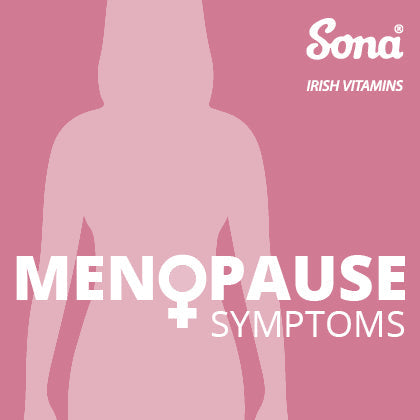
Menopause doesn’t always begin with the expected hot flushes or night sweats. For many women, the first signs appear earlier and more subtly, such as lower energy, disrupted sleep, or unexpected changes in mood and concentration. These may be among the early symptoms of menopause, marking the onset of perimenopause, when hormonal changes start to affect both body and mind.
Understanding these menopause signs can help women adapt early and support their well-being through nutrition, lifestyle, and awareness. Recognising that menopause progresses through three main phases — perimenopause, menopause, and post menopause — helps bring clarity and confidence to this natural transition.
The Hidden Side of Menopause Symptoms
Many women associate menopause with hot flushes and night sweats. However, hormonal decline can also trigger a much wider range of symptoms. These are not always immediately linked to hormonal changes but can significantly affect comfort, energy, and mental clarity.
Menopause Joint Pain
Changes in oestrogen levels can affect inflammation and reduce joint lubrication, often causing stiffness or discomfort, particularly in the morning. Gentle movement, stretching and supplements that support joint health may help improve flexibility and ease discomfort.
Menopause Fatigue and Sleep Problems
Hormonal changes can interfere with sleep and energy metabolism, leading to persistent tiredness or insomnia. Restful sleep may improve with a consistent routine, balanced diet, and stress management. When fatigue becomes ongoing, it is worth discussing with a healthcare professional.
Brain Fog and Concentration Issues
Many women report forgetfulness or difficulty concentrating during perimenopause. These cognitive changes are usually temporary and improve once hormone levels stabilise. Regular physical activity, mindfulness, and sufficient rest can help maintain mental clarity.
Skin Dryness and Other Subtle Changes
Lower oestrogen levels reduce the skin’s ability to retain moisture, leading to dryness or irritation. Hydration, healthy fats, and vitamin-rich skincare can make a visible difference.
These experiences can be uncomfortable, but they are a natural part of the hormonal transition. When symptoms start to affect daily well-being, professional advice can help manage them effectively.
Nutrition, Vitamins and Natural Relief
During perimenopause and menopause, balanced nutrition can make a significant difference in how your body responds to hormonal changes. Some women may need medical treatment during this stage. However, simple dietary changes and the right nutrients can often help reduce discomfort and support overall well-being.
Vitamins for Menopause
Vitamins are essential for hormone balance, energy, and mood regulation during menopause. B vitamins, particularly B6 and B12, support the nervous system and can help ease tiredness and low mood. Vitamin D plays a key role in maintaining bone strength, while vitamin E provides antioxidant protection, helping to reduce oxidative stress that may rise during this time. To learn more about the causes of hormonal imbalance, read our article Are Your Hormones Out of Balance? Recognise the Symptoms Early.
Minerals and Omega Fatty Acids
Minerals such as magnesium and calcium support muscle and bone health, helping to counteract symptoms like tension and cramps. Magnesium also contributes to better sleep and relaxation, making it one of the most recommended menopause supplements.
Healthy fats, including omega-3 and omega-6, help maintain skin hydration and support brain and heart health during this stage.
Menopause Diet and Natural Remedies
A balanced menopause diet rich in fruits, vegetables, whole grains, and protein helps stabilise blood sugar and energy levels. Phytoestrogen-rich foods, such as soy, flaxseeds and chickpeas, may also provide mild natural hormone support.
In addition, natural remedies for menopause, such as herbal teas with chamomile or sage, mindfulness practices and gentle physical activity, can help ease stress and improve sleep quality.
By combining good nutrition with essential nutrients, women can support their hormonal balance and improve well-being throughout the menopause journey.
From Taboo to Transparency: The Rise of Modern Menopause
For much of the past century, menopause was seen as a private topic, rarely discussed or openly acknowledged. This silence left many women unprepared for the physical and emotional changes that accompany hormonal transition. However, growing menopause awareness in recent years has shifted the narrative from secrecy to empowerment.
Public health organisations and researchers now recognise menopause as an essential stage of women’s health that requires appropriate education, guidance, and menopause support. Health initiatives and awareness campaigns have helped bring menopause into public discussion, encouraging women to seek guidance and appropriate care.
This growing openness reflects the rise of modern menopause, which values accurate information, access to care and workplace understanding. Employers are increasingly introducing menopause support policies, while healthcare professionals emphasise personalised approaches rather than one-size-fits-all solutions.
By replacing outdated taboos with science-based knowledge, women are now better equipped to manage symptoms, protect their long-term health, and approach this life stage with confidence.
Final Thoughts
Menopause marks a natural transition in a woman’s life. With the right knowledge, nutritional support, and medical guidance, it can be a time to restore balance and confidence rather than discomfort.
References;
Harvard Health Publishing (2025) Menopause symptoms that may surprise you: What to watch for during perimenopause. Reviewed by Deborah Kwolek, MD. Harvard Health. Available at
